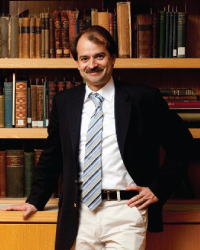Delta Omega Lecture Series features John P.A. Ioannidis, world-renowned epidemiologist and biostatistician
March 26, 2015

John P.A. Ioannidis
Join the Arnold School of Public Health as we host John P.A. Ioannidis who will present a seminar entitled, Objective Academic and Research Evaluation in the Modern University: Challenges and Opportunities for Quality Improvement, during the Delta Omega Lecture Series at 2 p.m. on Tuesday, April 21. The seminar will take place in the Program Room of the Ernest F. Hollings Special Collections Library, located in the Thomas Cooper Library.
Ioannidis holds the C.F. Rehnborg Chair in Disease Prevention at Stanford University, and he is a Professor of Medicine, Professor of Health Research & Policy and Director of the Stanford Prevention Research Center at Stanford University School of Medicine. He is also the co-director of the Meta-Research Innovation Center and director of the PhD program in Epidemiology and Clinical Research at Stanford. Ioannidis earned his medical degree and doctorate in biopathology from the University of Athens.
He has served as President of the Society for Research Synthesis Methodology, as an editorial member of 30 leading international journals and as editor-in-chief of the European Journal of Clinical Investigation. He has given more than 300 invited and honorary lectures and has been inducted in the Association of American Physicians and the European Academy of Cancer Sciences.
With 1.2 million hits since its publication in 2005, Ioannidis is best known for his paper, Why Most Published Research Findings Are False, which is the most-accessed article in the history of Public Library of Science.
He is a critical thinker whose talent for challenging existing beliefs has led him to become a highly regarded scientist—not just in the field of public health but across all subjects of scientific inquiry. With recent publications (e.g., Assessing the Value in Biomedical Research, Estimates of the Continuously Publishing Core in the Scientific Workforce) and innovative insights on evaluating faculty performance, Ioannidis has opened up new conversations among tenure and promotion committees across the country. The Atlantic selected Ioannidis as the Brave Thinker scientist for 2010, claiming that he “may be one of the most influential scientists alive.”
The Delta Omega Honorary Society in Public Health was founded in 1924 at Johns Hopkins University, in what is now known as the Bloomberg School of Public Health, when public health as a profession was in its early stages. To promote graduate study in the emerging field, Drs. Edgar Erskine Hume and Claude W. Mitchell, graduate students at the time, organized the honorary society to recognize outstanding achievement in public health. Today, Delta Omega has expanded to include more than 84 chapters throughout the world and boasts more than 15,000 members from graduate schools and programs of public health as well as the public health community.
The Mu Chapter of Delta Omega was established in 1978 at the Arnold School of Public Health. The Delta Omega Lecture Series at the University of South Carolina’s Arnold School of Public Health brings the nation’s leading scholars to campus to discuss the most important topics in public health education and research. Election to join the chapter is based on outstanding performance and scholarship by students, teaching and research by faculty and community service by alumni. New members are inducted at a reception on Wednesday, May 6 at the Public Health Research Center prior to the May 7 Hooding Ceremony at the Koger Center.



_01.jpg)
_02.jpg)